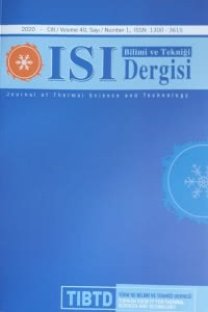An experimental investigation of refrigerant charge effects on mobile air conditioning system performance
Soğutucu akışkan miktarının otomotiv AC sistemi performansına etkisinin deneysel araştırılması
___
- Al-Rabghi, O. M. and Niyaz, A. A., Retrofitting R-12 car air conditioner with R-134a refrigerant. International Journal of Energy Research 24, 467-474, 2000.
- Anon., Renault car Maintenance Catalogue. Turkey. Reference 1200 200 255 (in Turkish), 1994.
- Anon.,.(http://www.et.web.mek.dtu.dk/Coolpack/UK/download.html), 2009.
- Brown, J. S., Yana-Motta S. F. and Domanski, P. A., Comparative analysis of an automotive air conditioning systems operating with CO2 and R134a. International Journal of Refrigeration 25, 19–32, 2002.
- Clodic, D., Yu, Y., Tremoulet, A. and Palandre, L., Fleet Tests and Mobile Air Conditioning (MAC) System Laboratory Test. http://www.sae.org/ technical/papers/2007-01-1187, 2007.
- Farzad, M., and O’Neal, D., System performance characteristics of an air conditioner over a range of charging conditions. International Journal of Refrigeration 14, 321–328, 1991.
- Holman, J. P., Experimental Methods for Engineers. 7th edition. McGraw Hill. New Delhi, 2001.
- Hosoz, M. and Direk, M., Performance evaluation of an integrated automotive air conditioning and heat pump system. Energy Conversion and Management 47, 545–559, 2006.
- Grace, I. N., Data, D. and Tassou, S. A., Sensitivity of refrigeration system performance to charge levels and parameters for on-line leak detection. Applied Thermal Engineering 25, 557–566, 2005.
- Joudi, K. A., Mohammed, A.S.K. and Aljanab, M.K., Experimental and computer performance study of an automotive air conditioning system with alternative refrigerants. Energy Conversion and Management 44, 2959–2976, 2003.
- Jung, D., Park, B. and Lee H., Evaluation of supplementary/retrot refrigerants for automobile air-conditioners charged with CFC12. International Journal of Refrigeration 22, 558-568, 1999.
- Kaynakli, O. and Horuz, I., An experimental analysis of automotive air conditioning system. International Communications in Heat Mass Transfer 30, 273–284, 2003.
- Kim, J. H., Cho, J. M., Lee, I. H., Lee, J. S. and Kim, M. S., Circulation concentration of CO2/propane mixtures and the effect of their charge on the cooling performance in an air-conditioning system. International Journal of Refrigeration 30, 43-49, 2007.
- Lee, G. H. and Yoo, J. Y., Performance analysis and simulation of automobile air conditioning system. International Journal of Refrigeration 23, 243-254, 2000.
- Little, A. D., Global Comparative Analysis of HFC and Alternative Technologies for Refrigeration, Air Conditioning, Foam, Solvent, Aerosol Propellant, and Fire Protection Applications. Report for The Alliance for Responsible Atmospheric Policy, A.D. Little Inc., Acorn Park, Cambridge, MA, Reference 75966 (http://www.arap.org/adlittle/toc.html), 2002.
- Liu, H., Chen, J. and Chen, Z., Experimental investigation of a CO2 automotive air conditioner. International Journal of Refrigeration 28, 1293–1301, 2005.
- McCulloch, A., Midgley, P. M. and Ashford, P., Releases of refrigerant gases (CFC-12, HCFC-22 and HFC-134a) to the atmosphere. Atmospheric Environment 37, 889–902, 2003.
- Palm, B., Refrigeration systems with minimum charge of refrigerant. Applied Thermal Engineering 27, 1693–1701, 2007.
- Poggi, F., Tejeda, H. M., Leducq, D. and Bontemp, A., Refrigerant charge in refrigerating systems and strategies of charge reduction. International Journal of Refrigeration 31, 353–370, 2008.
- Ratts, E. B. and Brown, J. S., An experimental analysis of the effect of refrigerant charge level on an automotive refrigeration system. International Journal of Thermal Sciences 39, 592–604, 2000.
- Tamura, T., Yakumaru, Y. and Nishiwaki, F. Experimental study on automotive cooling and heating air conditioning system using CO2 as a refrigerant. International Journal of Refrigeration 28, 1302–1307, 2005.
- Wang, S., Gu, J. and Dickson, T., Modeling and experimental investigation of accumulators for automotive air conditioning systems. International Journal of Refrigeration 29, 1109-1118, 2006.
- Wongwises, S., Kamboon, A. and Orachon, B., Experimental investigation of hydrocarbon mixtures to replace HFC-134a in an automotive air conditioning system. Energy Conversion and Management 47, 1644-1659, 2006.
- ISSN: 1300-3615
- Yayın Aralığı: 2
- Başlangıç: 1977
- Yayıncı: TÜRK ISI BİLİMİ VE TEKNİĞİ DERNEĞİ
Gaz-Katı Yakıtlı Güç Santralinde Verim Artışının Ekserji Analizi Kullanılarak İncelenmesi
Zafer ŞAHİN, Mehmet KOPAÇ, N. Özgür AYDIN
Ferhat KAYA, Tevhit KARACALI, Mehmet Akif CEVİZ, İlhanVolkan ÖNER
Nedim SÖZBİR, Hasan Rıza GÜVEN, Cemil YİĞİT, S. C. YAO, Roy J. ISSA
Cemil YİĞİT, Nedim SÖZBİR, S.c. YAO, Hasan Rıza GÜVEN, Roy J. ISSA
Destilasyon Dizilerinin Genetik Tabanlı Bir Algoritma ile Ekserjetik Optimizasyonu
Fakir Yanma Şartları Altında Buji Ateşlemeli Bir Motorda Termal Verim ve Çevrimsel Farkların Analizi
Mehmet Akif CEVİZ, İlhan Volkan ÖNER, Ferhat KAYA, Tevhit KARACALI
Exergetic optimization of distillation sequences using a genetic based algorithm
Ice thickness measurement method for thermal energy storage unit
Levent ÇETİN, Mehmet Akif EZAN, Aytunç EREK
Soğutucu Akışkan Miktarının Otomotiv AC Sistemi Performansına Etkisinin Deneysel Araştırılması
